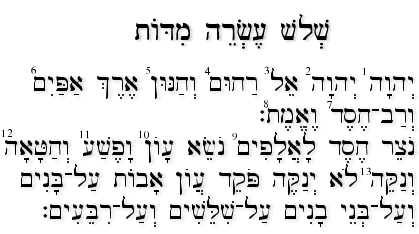Recently a friend (and mother of a three year old) asked me how I teach my two-year old about Yeshua. My answer was that at this point, we mostly read her Bible stories about Yeshua and tell her about Him as opportunities arise in daily life. Little ones learn (and believe) what they see, so ultimately everything that she will learn about Yeshua will be from watching us. However, this question stayed close with me and caused me to ponder the question of how to teach her about G-d in her homeschooling in a way she could understand, and that I could build upon as she grows.
In my pondering, I thought about what is traditionally called the Shelosh Esrei Middot or the "13 Attributes of G-d's Mercy" as taken from G-d's proclamation to Moshe in Exodus 34:6-9. It proved very helpful both in reminding me who G-d is, and as a guideline to use in teaching my daughter about Him. The Biblical text states:
"And the L-RD passed by before him, and proclaimed, The L-RD, The L-RD G-d, merciful and gracious, longsuffering, and abundant in goodness and truth, keeping mercy for thousands, forgiving iniquity and transgression and sin, and that will by no means clear the guilty; visiting the iniquity of the fathers upon the children, and upon the children's children, unto the third and to the fourth generation." (KJV)
 The following was taken from the website www.hebrew4christians.com in their parashah teaching on this portion of Scripture. "According to traditional interpretations, the thirteen attributes are articulated as follows:
Based loosely on these 13 attributes, I came up with the following "13 Things I know About G-d" craft to do with my daughter as an introduction for her: I used a circle traced from a bowl on a paper plate to make the center of our Sun. (I could only come up with either using the Sun or a flower as two possibilities for this because I wanted a center and ways to display the attributes around the edge.) I printed this on yellow card stock, cut it out using the same size circle and glued it to the paper plate, and then also printed the attributes and cut them out (there is a clip-art picture next to each one to help little eyes visualize the attribute, but they would not paste into this post. Email me at why_b_messianic@yahoo.com and I will gladly send you the original Word document!) 13 things I know about G-d! He: is Ruler of the World gives us everything we have doesn’t get angry easily is good to everyone keeps His promises remembers the good things we do is forgiving is kind is loving is holy is One gives life made everything The 13 Attributes were then glued to large Popsicle sticks that we painted yellow and glued around the circle to make "the Sun". (I made it a point to say that the Sun is not G-d, but G-d made the Sun.) Of course, for very young children, these attributes still need further explanation, and as parents we can use illustrations from our lives to clarify them and also make use of comparisons. In addition, I will make a point to add that "Yeshua is G-d" as we talk about Him, even though that may prove difficult to explain. This week, I introduced the concept that G-d is love, and next week look forward to our theme of "mitzvot & chores," which will lend itself to the "G-d remembers the good things we do" attribute. This will also be a great opportunity to teach what mitzvot are, and that they should be seen as acts of love and obedience and never as trying to earn favor (or salvation) from G-d. We will also learn about rewards & consequences. With Rosh HaShanah approaching, these concepts will be very important for our children to know amidst the popular understanding that our good deeds need to outweigh our bad ones and that we can actually work for salvation. I will continue to post on the individual attributes as we expound upon them in weekly parashot, as this will be an evolving (and never-ending) lesson. Children learn a lot through songs as well, so I will be gathering songs that can help teach these attributes. (Please share any that you know!) Because Psalm 145 also mentions several of these attributes, I like to sing the chorus of Shane & Shane's song "Psalm 145," which you can hear by clicking here. A book that we have and like is "My Little Golden Book About G-d," which talks about some of G-d's attributes. It also helps little children by making comparisons, such as comparing G-d's love to the strong arms of a daddy's hug or loving kisses from a mother, which makes it much clearer to a child. I will look for other books as well, and appreciate your recommendations. While this version of the attributes is meant for very small children, you can tweak it and include all of the 13 attributes for older children, which I plan to do in the future. I think that this is a good starting point for the little ones, though. It is my hope that you find the concept helpful in teaching your children as well. | |||||||||||||||||||||||||||||||||||||||||||||||||||||||||





you are blessed, and your offspring are doubly blessed! i was just wondering yesterday if you had posted again. :) thanks for the great craft idea!!! <3
ReplyDeleteand thank you for your sweet comment! :) I will email it to you!
ReplyDelete